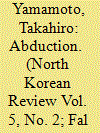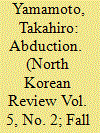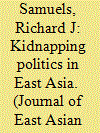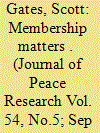|
|
|
Sort Order |
|
|
|
Items / Page
|
|
|
|
|
|
|
| Srl | Item |
| 1 |
ID:
092718


|
|
|
| 2 |
ID:
092927


|
|
|
|
|
| Publication |
2009.
|
| Summary/Abstract |
The abduction of 16 Japanese citizens from Japan by agents of the North Korean government took place from 1977 to 1983. In spite of a series of negotiations on this issue between the two countries, little has changed after the return of the five abductees and their family members in 2004. It is high time for Japan to ask such questions as: Has Japan failed? Is it really possible to bring all the abductees back? If not, what went wrong? This paper argues that Japan's massive public relations strategy toward its citizens, although successful in garnering public support, eventually backfired on the government: it left too little room for them to negotiate with North Korea. However, with the attention of the public being diverted from the abduction issue for a while, it may be a good time for Japan to overhaul its negotiation strategy.
|
|
|
|
|
|
|
|
|
|
|
|
|
|
|
|
| 3 |
ID:
117915


|
|
|
|
|
| Publication |
2012.
|
| Summary/Abstract |
Pragmatism is ever more popular amongst those who study international relations. Its emphasis on practice is generally acknowledged as a defining characteristic. There is, however, a general tension within pragmatist thought concerning practice, for pragmatism may emphasize the theorizing of practice. It is, then, distinguished from other theories in International Relations (IR) such as neo-realism or constructivism as a contender in their midst. We delineate a pragmatist theory of IR in the first part of this article, but insist on going beyond merely establishing the next paradigm, for pragmatism may also emphasize the practice of theorizing. Theories are, then, considered different tools useful for dealing with the social world. This will be corroborated in the second part by a close reading of William James. Finally, we submit that instead of a paradigm war, a metaphor such as that of the Papini hotel is needed in IR - a metaphor that accounts for theory competition without neglecting the limitations set by the practice of theorizing itself.
|
|
|
|
|
|
|
|
|
|
|
|
|
|
|
|
| 4 |
ID:
144700


|
|
|
|
|
| Summary/Abstract |
This article examines the failure of the Nigerian government to exercise its responsibility to protect (R2P) populations from mass atrocities in the wake of Boko Haram's violent and persistent attacks against civilians in north-east Nigeria. After the abduction of 276 schoolgirls on 14 April 2014, the affected communities engaged directly in protecting their villages and families. Another murderous and devastating attack on Baga in January 2015 and the abduction of over 400 women in Damasak in March 2015 continued to expose the governmental failure to protect people at risk of losing their lives. This article examines the dynamics of the people's response to the crisis and investigates whether this response could be conceptually defined as a ‘fourth pillar’ of R2P, when a state – even in collaboration with the international community – is unable to live up to its R2P. Certainly, such a phantom ‘fourth pillar’ is symbolic and should not be used in any way by governments to re-delegate their first pillar primary R2P.
|
|
|
|
|
|
|
|
|
|
|
|
|
|
|
|
| 5 |
ID:
078646


|
|
|
|
|
| Publication |
2007.
|
| Summary/Abstract |
North Korea became an urgent problem for Japan as a result of the 1994 nuclear crisis in North Korea, the 1998 missile launch over Japan and the 2003-4 nuclear crisis. At the historic Tokyo-Pyongyang summit in September 2002, both sides acknowledged the need to solve the security issues surrounding the Korean Peninsula through peaceful, multilateral efforts. However, the issue of North Korean abduction of Japanese citizens in earlier decades intensified Japanese sentiment against the North and this issue halted bilateral normalization talks. Japan has participated in six-party talks on the nuclear issue since 2004, but its distinct bilateral interests vis-à-vis North Korea, South Korea and the United States limit its influence in the multiparty engagement.
|
|
|
|
|
|
|
|
|
|
|
|
|
|
|
|
| 6 |
ID:
037517


|
|
|
|
|
| Publication |
London, Pelham Books, 1987.
|
| Description |
vii, 298p.Hardbound
|
| Standard Number |
0720716772
|
|
|
|
|
|
|
|
|
|
|
|
Copies: C:1/I:0,R:0,Q:0
Circulation
| Accession# | Call# | Current Location | Status | Policy | Location |
| 029312 | 364.154/BLE 029312 | Main | On Shelf | General | |
|
|
|
|
| 7 |
ID:
100263


|
|
|
|
|
| Publication |
2010.
|
| Summary/Abstract |
In this article, I examine two contemporary cases in which the same foreign adversary, North Korea (DPRK), violated the sovereignty of neighboring states. I use a comparison of South Korean and Japanese reactions to political captivity to assess institutional performance in democratic states and ways in which these dynamics are connected to international politics. We see how "captivity narratives" can be differentially constructed and deployed and how policy capture can be achieved by determined political actors. Civic groups in both countries worked to mobilize political support, frame the issue for the media, and force policy change. In Japan, politicians were more willing to use the abduction issue for domestic political gain than in Korea, where the political class was determined to prevent human rights issues (including abductions) from interfering with their larger political agenda, including improved relations with the DPRK.
|
|
|
|
|
|
|
|
|
|
|
|
|
|
|
|
| 8 |
ID:
155200


|
|
|
|
|
| Summary/Abstract |
Unable to attract enough voluntary recruits, many rebel groups rely on force to fill their ranks. Given that the group used force to compel individuals to join, a coerced conscript would be presumed unlikely to be loyal and would be expected to desert at the first opportunity. Yet, groups that have relied on coerced recruitment retain their members just as well as, if not better than, rebel armies that rely on voluntary methods of recruitment. This is a puzzle. How do rebel groups maintain allegiance and prevent desertion, especially if they rely on abduction to staff their ranks? A recruit can be forced to join a rebel group, but continuing to rely on coercion to enforce retention is too costly and not sustainable. These groups must find a way to reduce the costs of retention. The solution to this puzzle rests in the mechanisms of socialization that shape the allegiance of forcibly recruited soldiers. Socialization mechanisms are traced through three outcomes: compliance (or Type 0 socialization), role learning (Type I socialization), and norm internalization (Type II socialization). Integrating socialization theory and a rational choice analysis demonstrates that mechanisms that alter preferences through Type II socialization are effective in retaining recruits; the highest level of retention occurs when several mechanisms work in concert. Illustrative case studies of the Lord’s Resistance Army from Uganda, the Revolutionary United Front in Sierra Leone, the Maoists in Nepal, and the Liberians United for Reconciliation and Democracy (LURD) show that a reliance on child soldiers, group assets (pecuniary and non-pecuniary), organizational structure, and the nature of military contestation shape when different mechanisms are effective or not.
|
|
|
|
|
|
|
|
|
|
|
|
|
|
|
|
|
|
|
|
|